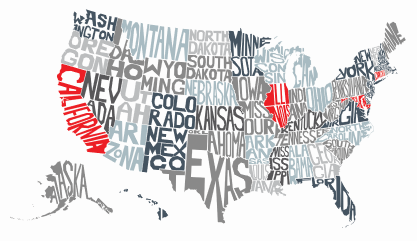
News from Our State and Local Operations (NL 2009)
FAIR Newsletter | Article 5 of 6 | September 2020 | Visit Our Newsletter Page | Full PDF Version

NEW JERSEY
Federal law expressly forbids illegal aliens from working in the United States. But the New Jersey state Senate did not let that “minor” detail deter it from approving a measure that would allow illegal aliens to obtain professional and occupational licenses. The more than 1.3 million New Jersians who are unemployed due to the COVID-19 crisis also proved to be another “minor” detail in the state’s relentless effort to reward and empower illegal aliens. SB 2455, passed the upper chamber by a 26-11 vote on June 29, with four Republicans joining 22 Democrats. The bill states that “Notwithstanding the provisions of any other law, rule, or regulation,
lawful presence in the United States shall not be required to obtain a professional or occupational license provided that the applicant meets all other requirements for licensure.” The state Assembly quickly followed suit, approving the measure by 47-26 vote on July 30. As of the completion of this edition of the newsletter Gov. Phil Murphy (D) had not signed the measure into law, however, he is expected to. According to his spokeswoman, who blurred the distinction between immigrants and illegal aliens, “Governor Murphy believes that immigrants are a critical part of the fabric of life in New Jersey, and that they should not face unnecessary barriers as they seek to participate in our society and economy.”
FLORIDA
On June 30, Florida Governor Ron DeSantis (R) signed Senate Bill (SB) 664 into law significantly expanding the pool of Sunshine State employers who are required to use the federal E-Verify employment authorization check system. The bill falls somewhat short of Gov. DeSantis’ campaign pledge to institute a universal E-Verify requirement in the state, but it is nevertheless an important step in the right direction against fierce resistance from many cheap labor business interests. The new Florida law requires:
- All public employers – state, county, municipal and special districts – to use E-Verify, previously the law required only some state executive branch agencies to use it.
- All public contractors to use E-Verify or lose their contracts.
- All recipients of state economic development incentives to use E-Verify or lose their incentive funding.
- Private employers to either use E-Verify to ensure the employment authorization of their new hires or if they don’t use E-Verify to keep their I-9 forms with all of their employee documentation which shows their eligibility to work in the United States for three years.
- Private employers to make all records and documents related to employment verification available on request to the Florida Attorney General, Florida Department of Law Enforcement, Office of Statewide Prosecution and their local state attorney’s office.
- A process for suspending and revoking the business licenses of private employers that fail to comply.
The newly enacted law is also a testament to the work of Floridians for Immigration Enforcement (FLIMEN), a local citizens’ activist group that works closely with FAIR. FLIMEN has pushed relentlessly for sensible state policies, like SB 664, which protect the interests and safety of Floridians.
MASSACHUSETTS
Both houses of the Massachusetts Legislature approved legislation that would dramatically expand illegal alien sanctuary policies in the Bay State under the guise of “police reform.” Senate Bill 2820 and its House companion, H. 4886, create “oversight boards” to monitor local police cooperation with federal immigration authorities. These boards would include representatives from illegal alien advocacy groups. Among other powers, these unelected and unaccountable boards would have the power to punish law enforcement and corrections officers who cooperate with ICE. Local law enforcement departments would no longer have the authority to set their own policies in this regard. The legislation would also bar federal authorities from accessing Motor Vehicles records and its facial recognition software.
The two versions of the legislation will have to be reconciled by a conference committee. It is unclear at this point if Republican Gov. Charlie Baker would sign the bill if it came to his desk.

